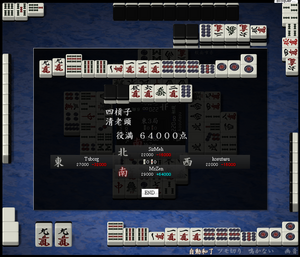Multiple yakuman

Multiple yakuman can be scored if a hand qualifies for more than one yakuman. Some rules do not allow multiple yakuman.
When a hand would score multiple yakuman, the number of yakuman is multiplied by the base yakuman value; a double yakuman is worth twice as much as a single yakuman, a triple yakuman is worth thrice as much, and so on. A hand with yakuman does not score han and fu, so kazoe yakuman can never combine with other types of yakuman.
Scoring
There are three main variations to the multiple yakuman rule. Some rulesets only allow single yakuman, due to the huge value of a multi-yakuman hand.
Single yakuman cap
Multiple yakuman are disabled; a hand can only score one yakuman, maximum. In other words, yakuman do not stack. Many professional organizations in Japan use this rule.
Cumulative single yakuman
Allow yakuman to stack. However, each individual pattern is always worth a single yakuman (e.g. daisuushii is worth one yakuman and not two). This rule is most notably used in tenhou.net.
Full scoring
Allow yakuman to stack. In addition, certain yakuman patterns are worth double on their own:
- Daisuushii is always a double yakuman, as it is more difficult to complete than the lesser hand shousuushii.
- Kokushi musou is a double yakuman when completed on a 13-sided wait.
- Chuuren poutou is a double yakuman when completed on a 9-sided wait.
- Suuankou is a double yakuman when completed on a tanki wait. This is also the only way that the yakuman can win by ron.
In a few rulesets, tsuuiisou in chiitoitsu form can be worth a double yakuman - this is known as the local yakuman, daichisei.
Point values
| Dealer ron | Dealer tsumo | Non-dealer ron | Non-dealer tsumo |
|---|---|---|---|
| 48,000 from the discarder | 16,000 from all players | 32,000 from the discarder | 16,000 from the dealer; 8,000 from the non-dealers |
These values are multiplied by the number of yakuman in the hand (assuming multiple yakuman are used).
Example multi-yakuman hands
* Single yakuman cap: 1 yakuman. * Cumulative single yakuman: 1 yakuman. * Full scoring: 2 yakuman.
* Single yakuman cap: 1 yakuman. * Cumulative single yakuman: 2 yakuman. * Full scoring: 2 yakuman.
* Single yakuman cap: 1 yakuman. * Cumulative single yakuman: 2 yakuman. * Full scoring: 2 yakuman.
* Single yakuman cap: 1 yakuman. * Cumulative single yakuman: 3 yakuman. * Full scoring: 4 yakuman.
The largest hand possible
* Single yakuman cap: 1 yakuman. * Cumulative single yakuman: 4 yakuman. * Full scoring: 6 yakuman.
Game examples
| |||||||||||||||||||||||||||||||
